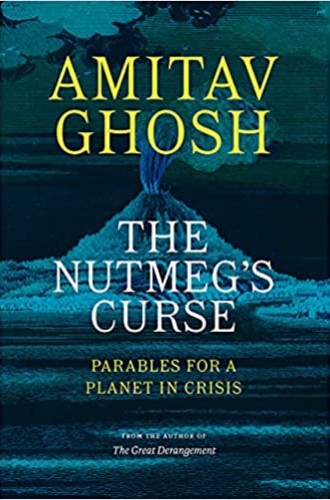What if the trees are waiting us out? They’ve been on earth longer than our species, and their lifespans often exceed ours, notes Amitav Ghosh. Perhaps they are “gardening humans.” As they throw off settlers in drastic climate events, they root us out, the empire of landscape striking back.
This kind of exhilarating change of perspective threads throughout The Nutmeg’s Curse. An extraordinary storyteller and master of the decisive detail, Ghosh sings the ancestral story of nutmeg, summoning from the smallest of nuts a universe of both blessing and curse. “Taking a nutmeg out of its fruit is like unearthing a tiny planet,” he writes, and in this planet the nutmeg reveals itself as an agent of mythic vitalism. A Dutchman visiting Indonesia’s Banda archipelago in search of the nutmeg hears a sound one night, an overturned lamp triggers a full-scale slaughter, and the tale becomes an intricate unfurling of how such a geopolitical pressure point arose—and, even more insistently, how it speaks to our own time of environmental peril. This story, assures the bard, can save us.
Ghosh reweaves myth as a source of power, showing nature to be its own protagonist in tales of volcanoes, islands, spices, and other nonhuman entities. A clove sculpture atop a fort’s monument reveals botany as an icon of the dynamics of empire. Replacement myths and wars over renaming displace nature’s vibrant material power with visions of European male scientific knowledge. The Dutch may have exported their “mythmaking of modernity” with illusions of freedom from material dependence, but the small islands in the Indian Ocean that are home to the nutmeg intone a more honest and liberating truth.





